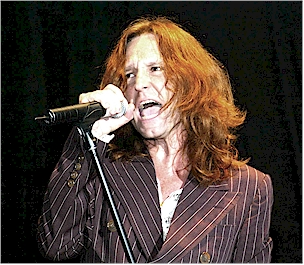 I was a John Waite fan before I even knew who John Waite was. “Everytime I Think of You,” the 1978 hit he had with The Babys, was an AM radio staple at a time when I listened to a lot of AM radio, and the song was a favorite of mine. When he next surfaced in my consciousness six years later—with his solo masterpiece, “Missing You”—I was older (14 years old, instead of eight) and wiser (well … I was pretty decent at Algebra), and still enamored with the radio and all the amazing sounds that emanated from it.
I was a John Waite fan before I even knew who John Waite was. “Everytime I Think of You,” the 1978 hit he had with The Babys, was an AM radio staple at a time when I listened to a lot of AM radio, and the song was a favorite of mine. When he next surfaced in my consciousness six years later—with his solo masterpiece, “Missing You”—I was older (14 years old, instead of eight) and wiser (well … I was pretty decent at Algebra), and still enamored with the radio and all the amazing sounds that emanated from it.
I recall once reading an interview with Waite in which he dismissed “Missing You,” alleging that the song and its popularity had somehow kept him from doing more “serious” work, or harder, edgier rock (stuff like “Euroshima,” from his No Brakes album, a virtually unlistenable political screed that made Sting’s “Russians” sound like a Nobel acceptance speech). This, of course, is silly; the hardest thing to write is a memorable pop song, and Waite certainly wrote one in “Missing You.” Better still, he gave voice to several other great songs written by others—stuff like “Change” (written by Holly Knight), “If Anybody Had a Heart” (J.D. Souther and Danny Kortchmar ), the aforementioned “Everytime I Think of You” (Jack Conrad and Ray Kennedy), and Bad English’s “When I See You Smile” (Diane Warren).
Waite might have just done it again. His new album, Rough & Tumble, features a lot of earnest hard rock that, quite frankly, sounds a little stiff to these ears. The record is comprised largely of collaborations with Matchbox Twenty guitarist Kyle Cook, and much of it maintains the rather bland sound that made Rob Thomas the mascara-wearing, fashion-show-attending, platinum-selling douchebag we all know and loathe. It’s a shame, really; someone of Waite’s stature deserves better, but if it gives him a good reason to go out on the road again to play for people who need to hear “Missing You,” I suppose it’s worth the effort. Plus, he’ll have something to pawn at his merch table besides his most recent Best-Of.
There is, however, one bit of tasty goodness amidst the high-volume vanilla—an honest-to-Gawd power ballad called “If You Ever Get Lonely.” To hear this song for the first time was, for me, to be transported to a magical place where the summer breeze was touched by honeysuckle, the night was all about long highways ahead and behind, and my scalp was still covered with hair. The song at once sounds classic and contemporary, a calm but desperate plea from a man to the lover he lost, the lover he hopes will return to him once again. Here—listen for yourself:
Pretty cool, huh? You gotta love how the acoustic guitar shimmers throughout, how the insistent bass drum pedal pushes the song along, how perfectly the song drops off after the middle eight, and how the strings form the perfect bridge to the concise dude-on-top-of-the-mountain slide guitar solo.
 I’m also impressed with the way the opening verse pulls us into the story via the singer’s end of a phone conversation:
I’m also impressed with the way the opening verse pulls us into the story via the singer’s end of a phone conversation:
Thanks for calling; it’s so good to hear your voice
You keep breaking up in all the static and the noise
But I keep listening ’cause I never had a choice
When it came to you.
There’s also and artful resignation in the way Waite closes the verse:
You sound happy; guess things are working out okay
And I’m getting better at putting one foot in front of the other.
Sometimes, he seems to say, the simplest things are the hardest to pull off, like walking when you feel more like throwing yourself off something very tall. Oh, but the real heartbreak is in the beautiful, pleading chorus:
But if you ever get lonely, if you miss me
If you need someone to listen
Even if it’s only the sound of someone’s voice who loves you
That you need to hear, you know where to find me
If you ever get lonely
You can forgive the grammatical pretzel in the middle (“the sound of someone’s voice who loves you / That you need to hear”); grammar is at best a tertiary concern in matters of the heart. What tugs at you is the lift of the first two lines and how Waite takes flight in singing them, and the way he’s brought back to earth by singing “you know where to find me.” It’s a last desperate clutch at the straw of the relationship, the last chance to reel in a woman who has clearly moved on (to “a new life and a new love / And a whole new set of friends”).
It’s classic heartbreak poetry, sung by one of the steadiest bearers of melody in the game. For four minutes, John Waite is undeniably back, and the honeysuckle breeze never smelled so sweet.
Related articles
- John Waite unearths old tunes for new album (reuters.com)
- Interview: John Waite (donewaiting.com)
- Death by Power Ballad: Steve Perry, “Running Alone” (popdose.com)
- Death by Power Ballad: KISS, “Reason to Live” (popdose.com)





Comments